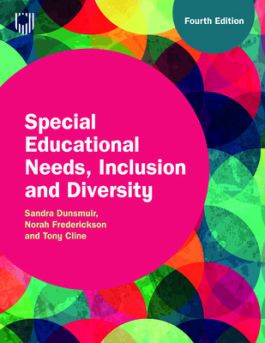Special Educational Needs, Inclusion and Diversity, 4e
4th Edition
0335251358
·
9780335251353
© 2024 | Published: March 19, 2024
“This new edition of an indispensable textbook… covers a huge range of topics illustrated by case studies and practical activities. It will enable schools to navigate through the complex challenges they meet on a daily basis, making education bot…
Read More
After you purchase your eBook, you will need to download VitalSource Bookshelf, a free app. Then login or create an account and enter the code from your order confirmation email to access your eBook.
- Note: the eBook does not include access to Connect
- Access the eBook anytime, anywhere: online or offline
- Create notes, flashcards and make annotations while you study
- Full searchable content: quickly find the answers you are looking for
PART ONE - Principles and concepts
1 Special education needs, inclusion and diversity: an integrated approach
2 Stakeholders in special educational needs and inclusion
3 Concepts of special educational needs
4 Inclusion
5 Special educational needs: developmental frameworks
PART TWO - Assessment in context
6 Identification and assessment
7 Bias and equity in assessment
8 Assessment for learning
9 Learning environments
PART THREE - Areas of need
10 Language
11 Autism
12 Learning difficulties
13 Literacy
14 Mathematics
15 Behaviour in school
16 Social, emotional and mental health needs
17 Sensory needs
18 Physical needs
1 Special education needs, inclusion and diversity: an integrated approach
2 Stakeholders in special educational needs and inclusion
3 Concepts of special educational needs
4 Inclusion
5 Special educational needs: developmental frameworks
PART TWO - Assessment in context
6 Identification and assessment
7 Bias and equity in assessment
8 Assessment for learning
9 Learning environments
PART THREE - Areas of need
10 Language
11 Autism
12 Learning difficulties
13 Literacy
14 Mathematics
15 Behaviour in school
16 Social, emotional and mental health needs
17 Sensory needs
18 Physical needs
“This new edition of an indispensable textbook… covers a huge range of topics illustrated by case studies and practical activities. It will enable schools to navigate through the complex challenges they meet on a daily basis, making education both inclusive and effective for all.”
Uta Frith, Emeritus Professor in Cognitive Development, University College London, UK
“This updated edition of an already essential text is a must read for anyone with an interest in special educational needs, inclusion and diversity in education. It is thoroughly researched, accessibly written, and strikes the perfect balance between emphases on theory, research, policy and practice throughout.”
Neil Humphrey, Sarah Fielden Professor of Psychology of Education, University of Manchester, UK
Special Educational Needs, Inclusion and Diversity has established itself as the textbook on special educational needs and disabilities (SEND). This new edition retains the considered balance between theory, research and practice, written in an accessible, user-friendly style.
The fourth edition contains key updates in response to changes in the field, including developments in national policy and ways of thinking about SEND. There is a focus on reducing inequalities and enhancing inclusion to ensure relevance to working within diverse communities. Up-to-date psychological and educational methods are examined in the book to support assessment and evidence-based intervention with children and young people.
Key features include:
• The increasingly diverse SEND approaches across England, Wales, Scotland and Ireland, within an international context
• Identification, assessment and intervention strategies for those with SEND aged from 0-25 years
• Extensive exploration of current developments, in particular within autism, mental health, mathematics and sensory needs
• A focus on professional ethics, parental support for learning and person-centred practices
• Case studies and learning activities to reflect contemporary best practice
Special Educational Needs, Inclusion and Diversity is a comprehensive guide for educational professionals to support them in maximising inclusion while recognising and supporting diversity.
Sandra Dunsmuir is Professor of Educational and Child Psychology at University College London, UK.
Tony Cline is Honorary Research Fellow with the Educational Psychology Group at University College London, UK.
Norah Frederickson is Emeritus Professor of Educational Psychology at University College London, UK.
Uta Frith, Emeritus Professor in Cognitive Development, University College London, UK
“This updated edition of an already essential text is a must read for anyone with an interest in special educational needs, inclusion and diversity in education. It is thoroughly researched, accessibly written, and strikes the perfect balance between emphases on theory, research, policy and practice throughout.”
Neil Humphrey, Sarah Fielden Professor of Psychology of Education, University of Manchester, UK
Special Educational Needs, Inclusion and Diversity has established itself as the textbook on special educational needs and disabilities (SEND). This new edition retains the considered balance between theory, research and practice, written in an accessible, user-friendly style.
The fourth edition contains key updates in response to changes in the field, including developments in national policy and ways of thinking about SEND. There is a focus on reducing inequalities and enhancing inclusion to ensure relevance to working within diverse communities. Up-to-date psychological and educational methods are examined in the book to support assessment and evidence-based intervention with children and young people.
Key features include:
• The increasingly diverse SEND approaches across England, Wales, Scotland and Ireland, within an international context
• Identification, assessment and intervention strategies for those with SEND aged from 0-25 years
• Extensive exploration of current developments, in particular within autism, mental health, mathematics and sensory needs
• A focus on professional ethics, parental support for learning and person-centred practices
• Case studies and learning activities to reflect contemporary best practice
Special Educational Needs, Inclusion and Diversity is a comprehensive guide for educational professionals to support them in maximising inclusion while recognising and supporting diversity.
Sandra Dunsmuir is Professor of Educational and Child Psychology at University College London, UK.
Tony Cline is Honorary Research Fellow with the Educational Psychology Group at University College London, UK.
Norah Frederickson is Emeritus Professor of Educational Psychology at University College London, UK.

